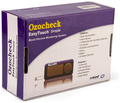




Ozocheck EasyTouch Simple Glucometer Blood Glucose Monitoring System with 10 Test Strips
Product highlights
- Provides results in 10 seconds
- High reading range of 20-600 mg/dL
- Memorises up to 180 test results
₹400
₹400+ free shipping with

Inclusive of all taxes
1 Box
SOLD OUT
Additional offers
Special offer: 100 % Off Use coupon PAYMENT-CART-100 in cart.
Information about Ozocheck EasyTouch Simple Glucometer Blood Glucose Monitoring System with 10 Test Strips
Ozocheck EasyTouch Simple Blood Glucose Monitor with 10 Test Strips has been designed especially for the Indian population. It is a pack of strips that help check blood glucose levels easily and accurately.
Uses:
This glucometer helps to keep blood sugar levels in check.
Product Specifications and Features:
Compatible With:
Ozocheck easy touch simple blood glucose test strip
Directions for Use:
Safety Information:
Quick Tips:
Frequently Asked Questions:
Q. How often should you test your blood glucose levels?
In the case of type 1 diabetes, check the blood glucose levels several times a day, such as pre and post-meals and before and after exercise or as advised by the doctor. Whereas, in the case of type 2 diabetes, monitoring the sugar levels might be based on the severity of the condition, which can be several times a day, once a day, or thrice a week. Hence, talk to the doctor about how often blood glucose levels should be tested.
Q. Can blood sugar strips be reused?
No. All the blood glucose test strips are for single use only. It is strongly advised always to discard a test strip after every use. Do not reuse a test strip, as it may not provide the appropriate results.
Q. How do blood glucose monitors work?
Diabetes devices or glucometers test the amount of glucose in the blood. The test strips in glucometers contain an enzyme glucose oxidase, which reacts with glucose in the blood and sends the result as an electronic signal displayed on the monitor.
Uses:
This glucometer helps to keep blood sugar levels in check.
Product Specifications and Features:
- Content: Blood glucose metre, user’s manual, ten blood glucose test strips (optional), ten lancets, puncturer (lancing device), pouch, battery, ten swabs (optional)
- Measuring range: 20-600 mg/dL
- Measuring time: 10 sec
- Memory: Stores up to 180 test memory
- Battery requirements: CR 2032
- Minimum blood sample Needed: 2.5 microlitres
Compatible With:
Ozocheck easy touch simple blood glucose test strip
Directions for Use:
- Insert a test strip into your meter
- Prick the side of your fingertip with the needle (lancet) provided with your test kit
- Touch and hold the edge of the test strip to the drop of blood
- The meter will display your blood sugar level on a screen after a few seconds
Safety Information:
- Keep out of the reach of children
- Store in a cool and dry place
- Should be protected from direct light
- Always discuss the results with a registered medical practitioner
- Do wash your hands thoroughly with an antiseptic hand wash before the test
Quick Tips:
- For in-vitro diagnostic use only
- Do not squeeze your finger when taking a blood drop sample
Frequently Asked Questions:
Q. How often should you test your blood glucose levels?
In the case of type 1 diabetes, check the blood glucose levels several times a day, such as pre and post-meals and before and after exercise or as advised by the doctor. Whereas, in the case of type 2 diabetes, monitoring the sugar levels might be based on the severity of the condition, which can be several times a day, once a day, or thrice a week. Hence, talk to the doctor about how often blood glucose levels should be tested.
Q. Can blood sugar strips be reused?
No. All the blood glucose test strips are for single use only. It is strongly advised always to discard a test strip after every use. Do not reuse a test strip, as it may not provide the appropriate results.
Q. How do blood glucose monitors work?
Diabetes devices or glucometers test the amount of glucose in the blood. The test strips in glucometers contain an enzyme glucose oxidase, which reacts with glucose in the blood and sends the result as an electronic signal displayed on the monitor.
Country of origin: China



